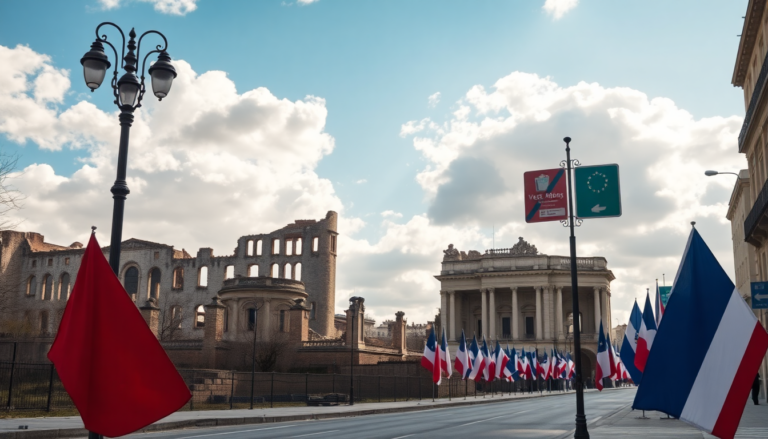Argomenti trattati
May 8, 2025, may seem like just another day on the calendar for many, but for those who remember, May 8, 1945, signifies an extraordinary turning point. It was VE Day—Victory in Europe Day—a momentous occasion that marked the end of the Second World War in Europe. With Hitler’s suicide just days prior, Nazism crumbled, and the oppressive regime of the Third Reich was dismantled. The streets of Berlin lay in ruins, still stained by the aftermath of conflict, while cities like London, Paris, and New York erupted in joy as the harrowing six years of violence finally came to a close. However, amidst the celebrations, a somber reality lingered: 60 million lives were lost, and the globe held its breath, waiting for news of ongoing battles, particularly in the East.
A day of mixed emotions
The atmosphere on that historic day was a blend of jubilation and grief. As crowds gathered, celebrating the end of a brutal chapter in human history, many also felt the weight of loss and the uncertainty of what lay ahead. While the war in Europe was over, the conflict with Japan was far from resolved, with fierce battles still raging. Little did the world know that the atomic bomb would soon unleash unimaginable destruction on Japanese cities, leading to further discussions on the morality of warfare and human suffering.
Dr. Sarah Irving-Stonebraker, in her book ‘Priests Of History: Stewarding The Past In An Ahistoric Age,’ emphasizes a critical point: our inability to grasp the future is rooted in our neglect of history. The lessons learned from past conflicts are often overshadowed by contemporary concerns, leaving us vulnerable to repeating the same mistakes. This week, as news cycles buzz with political elections, social issues, and sports updates, the 80th anniversary of VE Day barely garners attention. Yet, remembrance services across the UK and Europe serve as a poignant reminder of the sacrifices made and the importance of commemorating peace.
History and its implications
In a world where we are often distracted by fleeting headlines, it’s essential to reflect on the implications of past events. The rise of nationalism and conflict in parts of Europe today echoes the tumultuous history of the 20th century. Countries like Poland and Finland are taking proactive measures to safeguard their sovereignty amid rising tensions, while regions like Southeast Asia grapple with fragile peace. The ongoing struggles in places like Gaza and the alarming exchanges between India and Pakistan remind us that the specter of war is never too far away.
As we ponder these realities, we are compelled to engage with our history. Figures such as C.S. Lewis remind us that war does not create new circumstances; it amplifies the enduring human condition. It’s vital to acknowledge that while technology and society may evolve, the core of humanity, with its capacity for both love and destruction, remains unchanged. The paradox of our existence lies in our extraordinary potential for creativity and kindness, juxtaposed against our history of repeated conflicts and atrocities.
Learning from the past
Reflecting on the lessons from both the First and Second World Wars is crucial for understanding our present and future. The insights drawn from historical figures like Thucydides and Churchill can provide us with frameworks to navigate contemporary challenges. The Bible, often regarded as a profound historical text, offers wisdom that transcends time, guiding us towards peace, understanding, and the exploration of the human condition.
As we face rising geopolitical tensions, the urgency to educate ourselves and the younger generations about history is paramount. We must not shy away from the uncomfortable truths of our past, as they are essential for fostering a more peaceful future. The struggle against ignorance and apathy is ongoing, and it is our responsibility to engage with these lessons actively.
The fragility of peace
There is an undeniable fragility to peace, often disrupted by the ambitions of new ideologies and authorities seeking to test the limits of tolerance. The lessons learned from the tumult of history remind us that complacency can lead to dire consequences. We must remain vigilant and proactive in our pursuit of justice and understanding, standing against the tide of hatred and division that can easily resurface. The challenges we face today, whether in the political arena or social discourse, require a commitment to empathy and collaboration.
As we remember the sacrifices made on VE Day, let us not forget the broader implications of our actions and choices in the present. History has a way of repeating itself if we fail to recognize the signs. The complexities of human nature, coupled with our capacity for both good and evil, dictate that we must strive for a better understanding of ourselves and others.
A call to action
In light of these reflections, let us advocate for a world that values the lessons of history. Educational institutions must prioritize historical literacy, encouraging critical thinking and discussions around the implications of our past. We must foster environments where young minds can explore the narratives that shaped our world, promoting dialogue and understanding.
As we navigate a future that may hold challenges reminiscent of the past, let us commit to being informed and engaged citizens. The legacy of VE Day is not merely a memory; it is a clarion call urging us to learn from our history, to celebrate peace, and to work tirelessly towards a future devoid of conflict.

